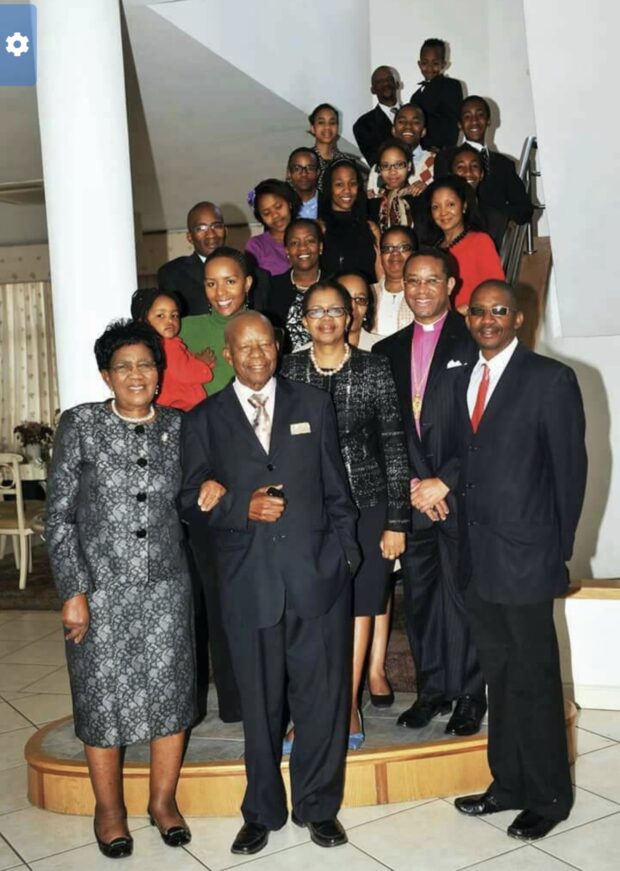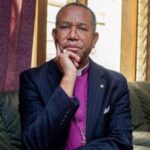Celebrating One of Africa’s Greatest Leaders: A Tribute to Sir Ketumile Quett Joni Masire – Part 2

1958 was a very significant year. That was the year Masire married Gladys Olebile Molefi on January 2. Born in Modimola near Mafikeng, after graduating from Tiger Kloof, she became a teacher at Mafikeng and later Kanye. A woman of substance, she was God fearing, kind, humble, compassionate, and hardworking; who years later as First Lady was a gracious Mother of the Nation. As wife to president Masire, she was his pillar, always caring and supportive of him. Lady Masire dedicated herself to several charities that focused on the plight of disadvantaged and marginalised children, unemployed and delinquent youth and women’s empowerment. They were a splendid couple and their marriage was blessed with six children. In August 1960, Sir John Maud, the High Commissioner on a familiarization visit of Beuchanaland was at the Serowe kgotla. Masire as a photo-journalist covered the event for his paper. He took Seretse’s picture in the kgotla and then cheekily walked up to him to ask his permission after the fact. Seretse was immensely amused by this cheekiness and a lifelong friendship was born. It was in 1961 that Masire literally stumbled into politics. He was in Lobatse to cover a public meeting of the newly formed Bechuanaland People’s Party (BPP). Masire, who had an interest in public affairs, was curious about the new political party. At the end of the meeting he was not impressed and thought, “If these are the kinds of people who are going to lead our country, we are in trouble.” Towards the end of 1961, Seretse Khama, who shared the same sentiments proposed the formation of a new party, the Bechuanaland Democratic Party (BDP). Masire resolved that if he could be of any use to the nation, then he needed to participate in politics. Masire knew Seretse as a democrat through and through who believed strongly that the nation resides in the people, and not in any individual. The two worked well together. It was a complementary partnership that flourished on Seretse’s vision and charisma and Masire’s energy, analytical brilliance, and organisational ability. They were candid and honest with each other, and both had a lively sense of humour. They were born leaders. Both believed in the need to move people from thinking about their tribes as their separate communities to thinking about the whole nation as their community. Both believed that in any society they needed to be a balance between the interests of individuals and those of the larger community. Both believed that individuals should be given the freedom to come up with the best they were capable of. The cardinal principle on which the Botswana Democratic Party was founded was a non-negotiable article of faith that the founders and other leaders subscribed to: “The party only matters to the extent that it can meet the needs of the nation; otherwise there is no need for it. If it ceases to meet the needs of the country, then it should cease to exist.” This is ageless wisdom applicable to all political parties in the world. In adherence to this article of faith Seretse and Masire crafted a short document in 1962 that outlined in broad-brush terms, the direction which the party would take. The document on “Aims and Objectives” became the “Four National Principles”. It highlighted what mattered, viz, to establish a nation that exemplified non-racialism, one united nation, fundamental human rights, a reformed and democratic local government which were then all missing in Bechuanaland. The “Four National Principles” gave clarity as to what Botswana wanted, and from observing other countries, what to avoid. In his memoirs president Masire wrote that the BDP was built by trial and error. “No one came with a dogma to be followed. We shared stories, and we learned from each other and from the people we consulted. The party grew organically, and it was very encouraging to see it happen. This was the fundamental difference between us as a party and the People’s Party and its subsequent mutations. They fed their followers with slogans and dogmas picked up from elsewhere. They thought they could just tell people any cock- and-bull story, and the people would accept it. Our experience was that ordinary people wanted to be given reasons. We did our best to show them why we were thinking and acting the way we were. As we prepared for moving to self-rule and then independence, our biggest fear was that we would lack unity, and that each tribe might think of itself as a separate entity. We feared if we went the way of some other states we would be in for serious trouble. This is why we laid emphasis on finding all the things that would unite us, and trying to avoid all the things that would divide us. Our Four Principles-Democracy, Development, Unity and Self-Reliance-addressed the things that really worried us during the formative years before independence. We knew we needed both to adhere to our principles, and to fight against anything that would threaten them.” This was the vision that ushered in Botswana’s independence on September 30, 1966. At independence Botswana was among the poorest countries in the world and surrounded by racist minority regimes in Namibia, Zimbabwe and South Africa. Economic experts gazing in their crystal balls saw Botswana doomed to poverty and surviving forever on international aid. Sir Seretse Khama and Sir Ketumile Masire would often remind their colleagues that when they asked for independence, they were told that they were “either very brave, or very foolish”. Sir Ketumile Masire was to use this phrase as the title of his memoirs: “Very Brave Or Very Foolish? Memoirs of an African Democrat”. The economic experts advice was taken with a pinch of salt as Botswana proved them spectacularly wrong. As Botswana’s first vice-president and minister of finance and development planning, Masire initiated various initiatives to rescue Botswana from the category of the third most impoverished nation in the world, which in 1966 had an annual per-capita income of about US$60. The initiatives included channelling foreign aid, loans, and mining revenues into developing educational, health, power, transport, and communications infrastructure while encouraging small-scale services and industries and promoting commercial agriculture. The success of Masire’s development portfolio earned him kudos domestically and internationally.??In 1980 Botswana’s first President, Sir Seretse Khama died. The nation mourned grievously bereft of a great leader it had been fortunate to have at the time of its greatest need. Masire had lost both a great friend and political collaborator who was closer to him than anybody before or after. They were a good team. Their close cooperation on all aspects of politics and government for 20 years was an important factor in achieving Botswana’s successes. In mourning, Sir Ketumile Masire, graciously ascended to the presidency. His presidency commenced at a time the liberation fight against apartheid was intensifying and black South African liberation fighters of the African National Congress (ANC) began to infiltrate South Africa by crossing the borders of Botswana, Zimbabwe, and Mozambique. South Africa, in retaliation, attacked these countries. Botswana found herself in a dilemma as she could not break links with South Africa for economic reasons so she banned the ANC military wing from operating in Botswana, but allowed young men and women to enter who were fleeing South Africa to become ANC freedom fighters. With the discovery of diamonds in Botswana the government was pragmatic in making a deal with the South African gold and diamond giant, De Beers. The deal provided the government with substantial revenues from diamonds, which were used for the benefit of the people in services such as education and health. During the AIDS crisis the country funded its own programme at a huge expense while other African countries relied on international aid. The deal with De Beers gradually evolved because president Masire’s cautious and tenacious style convinced De Beers to build a sorting house in Gaborone where the diamonds were graded before being sent to De Beers in London. He also demanded that Batswana be trained in sorting and evaluating diamonds. Sir Ketumile transformed Botswana by anchoring her development in Tswana values. For example, the Tswana practice of consulting people was essential in progressing developmental policies. In 1991 he received an honorary knighthood of the Grand Cross of Saint Michael and Saint George from Her Majesty Queen Elizabeth II.
By the Rt. Rev’d. Dr. Musonda Trevor Selwyn Mwamba President of the United National Independence Party (UNIP), Zambia. (Formerly Bishop of Botswana)


